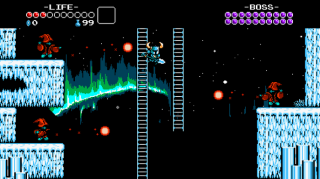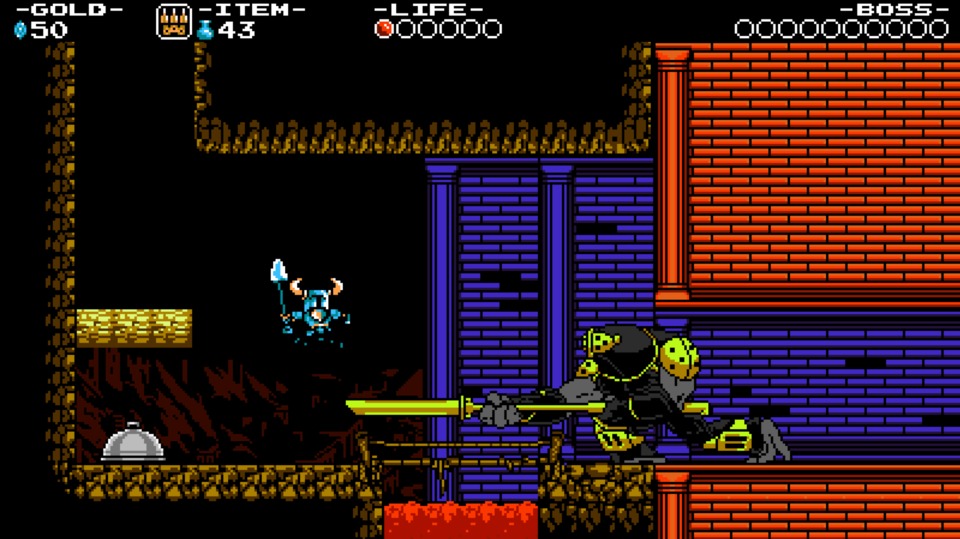How I feel about today's shooters is probably how others feel about the deluge of nostalgia-influenced platformers. There are always exceptions to the rule, though. Shovel Knight is one of them, a game that feels as though a historian unearthed a long lost cartridge from the late '80s, as game developers were making the NES perform tricks never thought possible. The debut game from Yacht Club Games feels like an unearthed relic, one I'm happy has been found. Shovel Knight feels both old and new, mining our collective memories for the right reason: making a good video game. And Shovel Knight is a very good video game.

Shovel Knight has a story insofar as any of these games have a surface-level justification for what's happening. Shovel Knight and Shield Knight have long protected the realm, but the world is soon corrupted by The Order of No Quarter (which just might be the best name for a group of enemies since...well, forever), lead by The Enchantress. Shovel Knight is separated from Shield Knight, and it's up to Shovel Knight to start digging to victory. In practical terms, this means players are running around as Shovel Knight, and occasionally navigating an overworld map that gives limited agency over which major enemy you'll tackle next.
The problem with many of these kinds of games is they're often unsure which master to serve, and get caught up praying at the altar of the past. Shovel Knight could not exist without the 8-bit classics, sure, but it's not explicitly beholden to its conventions, either. It's a decidedly modern game leveraging gaming's history as a starting point. It's a means to an end, not the end itself. That's where so many of these games get it wrong.
DuckTales and Mega Man fans will feel right at home with Shovel Knight. The character's weapon--yes, a shovel--is used to attack enemies, destroy objects, and bounce on stuff. Most of Shovel Knight's attacks, even when he begins acquiring magical relics in each stage, require him to get very close to obstacles in his path. With rare exceptions, Shovel Knight is incapable of standing on the other side of the screen and slowly clearing a path forward. Being able to pogo stick on top of enemies gives players flexibility in their tactics, allowing them to play a cautious form of offense that provides room to breathe. Understanding the physics of one's shovel-assisted jumps is crucial to finding the game's myriad secrets, as well. Most are hidden behind both marked and unmarked walls that must be destroyed, and others require deviously timed jumps that let you cover great distances, both horizontally and vertically, that would be impossible otherwise.
The secrets are half the fun in Shovel Knight, too. They're everywhere, making every screen more than just a set of hazards to navigate. The secrets often contain plentiful treasure, the currency used to purchase upgrades for Shovel Knight. Both health and mana upgrades are available in limited quantities, in addition to armor with certain bonuses (i.e. dropping less treasure after dying) and new shovel attacks (i.e. shooting a ground-level fireball while at full health). Shovel Knight can acquire a host of magical abilities, as well, which can be purchased by finding a vendor within a level or completing the stage and finding that same vendor back in town. Unlike Mega Man, weapons aren't explicitly linked to bosses, even though stages are themed around the last encounter.
Part of what makes Shovel Knight stand out is what doesn't stand out. The controls feel right. While playing, the character always landed where I wanted him to. The controls are tight, responsive, and do exactly what you want. That may sound simple, but without this, Shovel Knight wouldn't work. We often focus on games that get this wrong, not games that get it right. When it feels right, you don't notice it. That means the developer nailed it. When it doesn't feel right, it's terribly obvious. Super Meat Boy is a fantastic game for many reasons, but Super Meat Boy works because the player feels in control. It's why I've never enjoyed LittleBigPlanet beyond the charming aesthetic and wonderfully curated soundtrack. A sequence of tricky jumps is an entirely worthy task to ask of a player when they can reliably know the coming deaths will be entirely their fault.

It's the little things in this game, too. The delightful idle animations for the world's many characters, an elaborate dance sequence by a giant fish for no reason, the discovery of a hidden boss in a room full of hats, using a fishing rod to find off-screen treasure. These touches extend beyond the caretakers of the game's visuals, too. For example, you can jump higher than what the game is currently showing on the screen at any time. If you're at the top of the screen during a forced scrolling sequence, your head doesn't butt up against an invisible barrier. You can actually leap into the blackness of the UI. It's a small touch, but one that actually proves useful.
That said, there was a cocktail of emotions when the credits rolled on Shovel Knight. I was upset the game had come to an end, since I'm now left waiting for the hopefully inevitable sequel. But I wondered if Shovel Knight played it too safe. One cannot speak of games gone by without acknowledging how brutally difficult they were. If you, like me, were a kid granted one, precious game every few months, you milked those games for all they were worth. One reason that worked was because the games were so god damned hard. (My mom actually called a customer support line to complain after my brother and I finished Turtles in Time in two hours.) The challenge wasn't always earned, and often it was cheap, but you had to legitimately cross the finish line.
That's not the case in Shovel Knight, an especially easy game by classic standards. I died a handful of times, a few spots gave me some real trouble, but I wouldn't call Shovel Knight hard. It's a very accessible platformer for its type, which might come as a disappointment to some. Rather than embrace this facet of its influences, Shovel Knight asks players to accomplish other forms of herculean tasks, such as finishing the game without dying or health upgrades. For some, that will prove a worthy goal to chase, a reason to spend potentially hundreds of hours with Shovel Knight. But not for me. I wanted the game to ask more of me upfront, as I'm far less interested in masochistic challenges (the game's achievements are called "feats") layered on top of the game. Instead, I breezed right through Shovel Knight, and was left wishing the game had pushed me much, much harder.
My questions about the game's difficulty wouldn't matter if were talking about a lesser game, though. I simply wanted to love Shovel Knight even more than I already do. Shovel Knight is an exceptionally well-made action platformer, one worthy of being celebrated far beyond the nostalgic foundation it's built upon. Shovel Knight won't be the last old school game made in the modern age, but it's unlikely many others will be as much fun.